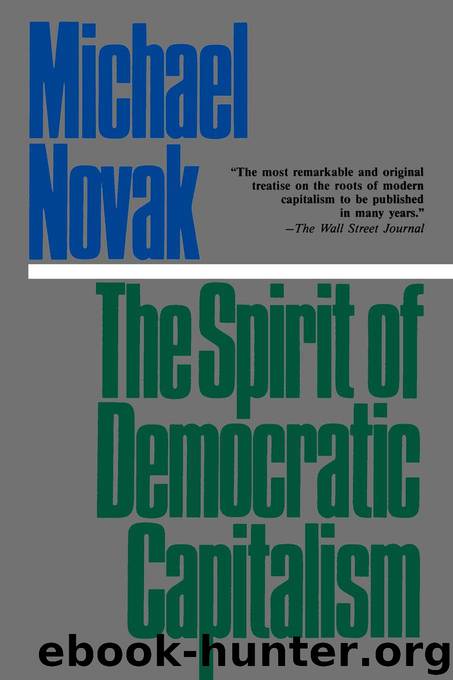The Spirit of Democratic Capitalism by Michael Novak

Author:Michael Novak
Language: eng
Format: epub
Publisher: Madison Books
Published: 1991-02-27T16:00:00+00:00
2
The Bias Against Democratic
Capitalism
“Any serious Christian,” Paul Tillich once said, “must be a socialist.”7 In the history of the last two hundred years, the favored ecclesiastical word for democratic capitalism has been “liberalism.” This word is almost always used pejoratively in the papal documents—not only in “The Syllabus of Errors” of Pope Pius IX in 1864, but also in the encyclicals of subsequent popes. In 1980, the superior general of the Jesuits, Father Pedro Arrupe, S.J., wrote: “. . . the type of social analysis used in the liberal world today implies an individualistic and materialistic vision of life that is destructive of Christian values and attitudes.”8
The traditional accusations against democratic capitalism fall into two categories: those against democracy and those against capitalism. Over the years, the former have fallen away. The churches have learned to cherish democracy and religious liberty, but resistance to capitalism remains. The generic and fundamental accusations against capitalism are that it is individualistic, materialist, and anarchic. At times, it is also suggested that capitalism fosters inequality (although comparisons are seldom undertaken with respect to inequality under other historical systems).
There are some excellent summaries of church teachings in this area.9 Instead of repeating them, it may be more useful to exhibit the sort of mental horizon, the complex of images and sensibility, which a devout Christian is likely to encounter in the church teachings on economics. There are many misunderstandings.
The first known use of the word “individualism” occurs in an essay by the French writer Joseph de Maistre in 1820.10 De Maistre used the word in an expression of disdain “for this deep and frightening division of minds, this infinite fragmentation of all doctrines, political protestantism carried to the most absolute individualism.”11 In 1829, the prominent French Catholic writer Lamennais assaulted “individualism” as a doctrine which nourishes “power without obedience” and “law without duty.” He added: “The same doctrine which produces anarchy among minds produces in addition an irremediable political anarchy, and overturns the basis of human society.” Both de Maistre and Lamennais influenced the course of nineteenth-century Catholic liberalism. Both were French, surely among the most individualist of peoples. And both respected social traditions and inarticulate social connections as did British Whigs like Edmund Burke. They were disturbed by the anti-clerical, anti-religious revolutionary secularism of France.
From the nineteenth-century Vatican, democratic capitalism seemed far away and heretical. In the nineteenth century, the social structure of Catholic Italy, Spain, and Austro-Hungary was still feudal, monarchical, and mercantilist. In 1864, the at first liberal pope, Pius IX (whose reign lasted 32 years, 1846–78), embittered by his experiences with Italian anti-clerical republicans, condemned nearly every thesis of a liberal society root and branch in his famous “Syllabus of Errors.”12 In 1891, Leo XIII at last addressed the large social questions racking the first modern societies in a letter addressed to the entire world, “On the Condition of Labor.” He was the first architect of what came to be thought of as the Catholic “middle way.”13 He roundly condemned socialism, even in its milder forms.
Download
This site does not store any files on its server. We only index and link to content provided by other sites. Please contact the content providers to delete copyright contents if any and email us, we'll remove relevant links or contents immediately.
| Anarchism | Communism & Socialism |
| Conservatism & Liberalism | Democracy |
| Fascism | Libertarianism |
| Nationalism | Radicalism |
| Utopian |
The Secret History by Donna Tartt(19085)
The Social Justice Warrior Handbook by Lisa De Pasquale(12190)
Thirteen Reasons Why by Jay Asher(8909)
This Is How You Lose Her by Junot Diaz(6885)
Weapons of Math Destruction by Cathy O'Neil(6279)
Zero to One by Peter Thiel(5801)
Beartown by Fredrik Backman(5752)
The Myth of the Strong Leader by Archie Brown(5507)
The Fire Next Time by James Baldwin(5442)
How Democracies Die by Steven Levitsky & Daniel Ziblatt(5218)
Promise Me, Dad by Joe Biden(5153)
Stone's Rules by Roger Stone(5087)
A Higher Loyalty: Truth, Lies, and Leadership by James Comey(4960)
100 Deadly Skills by Clint Emerson(4924)
Rise and Kill First by Ronen Bergman(4788)
Secrecy World by Jake Bernstein(4752)
The David Icke Guide to the Global Conspiracy (and how to end it) by David Icke(4717)
The Farm by Tom Rob Smith(4507)
The Doomsday Machine by Daniel Ellsberg(4490)
